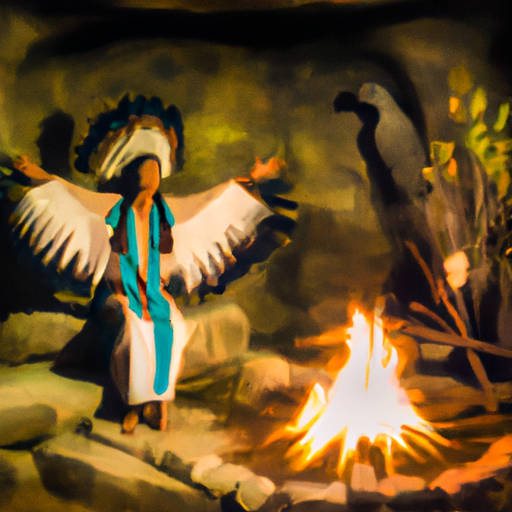– **Urban Adaptations: Modern Uses of Traditional Apache Techniques**

Introduction
Apache wisdom offers a rich tapestry of knowledge that has been passed down through generations, providing invaluable insights into sustainable living and resourcefulness. Today, as urban environments face numerous challenges, modern society finds inspiration in traditional Apache techniques to address these issues effectively. By integrating time-tested practices with contemporary innovations, cities can foster a more balanced and harmonious coexistence with nature.
One of the most notable aspects of Apache traditions is their deep connection to the land and a profound understanding of natural resources. This connection has guided modern urban adaptations in areas such as water conservation, sustainable agriculture, and eco-friendly construction methods. By embracing these ancient practices, urban communities are discovering new ways to reduce their ecological footprint and enhance overall well-being.
“The wisdom of the elders is essential for the survival of our people,”
is a sentiment echoed in many Apache teachings. This belief underscores the importance of drawing from ancestral knowledge to tackle present-day challenges. As cities continue to grow, revisiting and reimagining traditional Apache techniques can lead to innovative solutions that honor the past while building a resilient future.
History
The Apache have a rich history of adapting to their environment through innovative survival techniques. These techniques, honed over centuries, included knowledge of local flora and fauna, weather patterns, and sustainable living practices. Their resourcefulness allowed them to thrive in the challenging terrains of the American Southwest.
Apache wisdom was passed down through generations, primarily through oral traditions. Storytelling played a crucial role in teaching younger members the skills necessary for survival. This deep understanding of nature and community formed the foundation of their way of life.
In modern times, there has been a growing interest in revisiting and applying these traditional techniques to urban settings. Urban dwellers and sustainability advocates have recognized the value of age-old practices in addressing contemporary challenges. By integrating Apache methods, new solutions are being developed for sustainable living in cities.
“The strengths of our ancestors lie not in what we possess but in our understanding and relationship with the land” — Apache Proverb
Efforts to incorporate these adaptations include urban gardening, water conservation, and renewable energy use. Communities are exploring ways to blend traditional knowledge with modern technology to create more sustainable living environments. This movement seeks to honor Apache heritage while innovatively addressing the ecological demands of urban life.

An Apache story
The Apache people have a rich history of adapting to their environment, utilizing the natural resources at their disposal in ingenious ways. These techniques were honed over centuries, allowing them to thrive in some of the harshest conditions. The wisdom passed down through generations forms the bedrock of many traditional practices that are still revered today.
In modern urban settings, many of these time-honored methodologies have found new applications. The principles of resourcefulness and sustainability, intrinsic to Apache culture, are being revisited and admired. For instance, the practice of using natural materials for building and crafting has influenced environmentally conscious construction methods in cities.
The Apache’s expertise in herbal medicine is another area seeing a resurgence in contemporary urban communities. People are increasingly turning to natural remedies and sustainable healthcare practices inspired by indigenous knowledge. This revival not only preserves cultural heritage but also promotes a healthier and more sustainable lifestyle.
The adaptability and resilience inherent in Apache culture serve as an inspiration for tackling modern challenges. As urban areas continue to grow, the blend of traditional wisdom with modern innovation offers valuable lessons. By looking to the past, we can find sustainable solutions that benefit both our communities and the planet.
“We must learn from the deep wisdom of those who came before us, respect the earth, and carry forward traditions that teach us to live with honor and balance.” – Apache Elder
Under the canopy of city lights, Samuel, an elder of the Apache tribe, shared a story with a group of young Apache professionals in an urban park. The warm evening breeze carried the scent of pine needles, a distant reminder of their ancestral lands.
“Listen closely,” Samuel began, his voice steady and rich. “The city is not so different from the wilderness our ancestors knew. It may look different, but the lessons remain the same. Let me tell you about the time when I first came to this city.”
He paused, letting the distant rumble of traffic blend into the night’s sounds. “When I first arrived, it seemed vast and confusing. I felt like a deer stranded on an unknown mountain. But then I remembered the ways of our people.”
The group leaned in, eyes reflecting the city’s flickering lights. Samuel continued, “In the mountains, we always find our path by the stars. Here, the skyscrapers became my stars. I learned to navigate by the way shadows shifted and the way people flowed like rivers through the streets.”
His eyes twinkled with the memory. “One day, I saw a construction site. Men were struggling to lift beams, arguing about angles. It reminded me of our sweat lodges and the way we used the leverage of wood for strength. I approached them and suggested using a counterbalance technique our ancestors used for building. They were skeptical at first, but it worked. We lifted the beams effortlessly.”
Samuel smiled warmly at the young faces before him. “That day, I learned that our traditions are not bound to our lands—they travel with us, evolving in new forms. Just as our ancestors adapted to the changing seasons, so too must we adapt to this urban life.”
The group nodded thoughtfully, understanding dawning in their eyes. “Remember,” Samuel concluded, “the city, like the wilderness, holds challenges. Use what we know—our techniques, our way of seeing the world. Blend them with the new. This is how we honor our past and ensure our future.”
As the group dispersed, the city seemed a little less daunting, and the teachings of the Apache people, a guiding star in the urban landscape.
Implementing it in your life
Incorporating traditional Apache techniques into urban life begins with a mindset shift. Embrace simplicity, utilize resources efficiently, and value community connections as fundamental principles. By integrating these elements, you can bring harmony and resilience to the fast-paced modern environment.
Understand and respect the natural rhythms of your daily life. This involves recognizing when to exert effort and when to allow for rest and rejuvenation. Honor these cycles by creating a balance between work, social activities, and personal downtime.
To practically apply these concepts, consider making changes in small, manageable ways. Gradually adopting these techniques will weave them into the fabric of your everyday life without overwhelming you.
- Reduce clutter in your living space by keeping only what is necessary and meaningful.
- Practice mindful consumption by choosing environmentally friendly products and reducing waste.
- Engage with your community by participating in local events and supporting small businesses.
- Spend time outdoors regularly to reconnect with nature and find tranquility.
- Develop self-sufficiency skills, such as cooking from scratch or basic repairs.
- Balance your schedule to include time for relaxation and activities that regenerate your energy.
- Foster gratitude by appreciating the simple, everyday moments in life.
Implementing these steps can lead to significant personal growth. Embracing simplicity and mindfulness helps to reduce stress and increase overall well-being. Additionally, connecting with your community and nature can provide a sense of belonging and purpose.
By applying Apache wisdom to urban living, you cultivate resilience and adaptability. These qualities not only enhance your quality of life but also empower you to navigate challenges with grace and confidence.
Conclusion
The wisdom of the Apache people offers valuable lessons for contemporary urban living. By adopting traditional techniques like sustainable resource management and community-focused practices, modern cities can foster a more harmonious relationship with their environment. Integrating these methods not only preserves cultural heritage but also enhances urban resilience and sustainability.
The application of Apache techniques in urban settings demonstrates that ancient knowledge can provide solutions to modern challenges. This synergy of traditional wisdom and modern innovation can lead to more sustainable, efficient, and community-centric urban development. It’s essential for policymakers, urban planners, and citizens to embrace these practices for a better future.
“The land is sacred. These words are at the core of your being.” – Chief Seattle
Incorporating Apache techniques into our cities is more than a tribute to their culture; it’s a practical step towards achieving sustainability goals. We must take action now to integrate these practices into urban planning and everyday life. By doing so, we honor the wisdom of the Apache and pave the way for resilient and thriving urban environments.
The image and article have been augmented with AI.
Further Study:
- How do Apache spiritual practices influence their concept of wisdom and knowledge?
- What is the significance of the bow and arrow in Apache spiritual symbolism?
- What is the importance of silence and solitude in Apache spiritual practices?
- How do Apache people incorporate spiritual practices into their approach to art and creativity?
- How do Apache spiritual practices influence their approach to conflict and peace?
- How do Apache people incorporate spiritual practices into their approach to sports and physical activities?
- How do Apache spiritual practices influence their approach to death and dying?

Thank you for reading!






